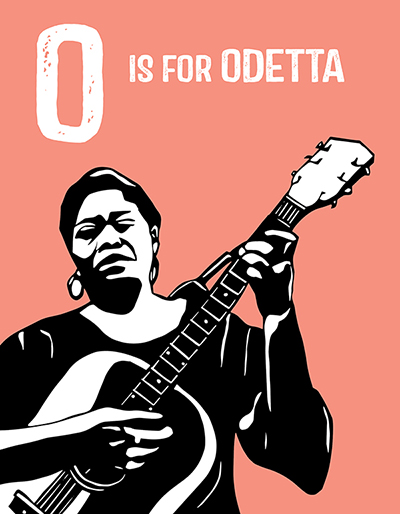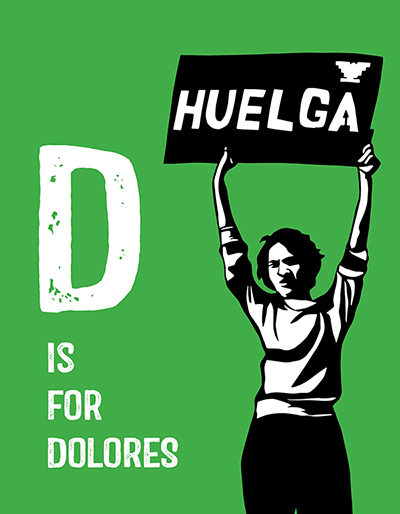Did you know that Truthout is a nonprofit and independently funded by readers like you? If you value what we do, please support our work with a donation.
Dolores Huerta and Odetta are two of the “rad women” featured in Rad American Women A-Z. The following are excerpts about them from the book.
Dolores Huerta: Who Demands Dignity and Justice for Farm Workers
Dolores Huerta was raised in Stockton, California, by a hardworking single mother. Dolores was an excellent student, and after she graduated from high school she became an elementary school teacher.
Many of her students were the children of farm workers, the people who plant and harvest the fruit and vegetables that end up on our dinner tables. They worked hard in the fields but made very little money, and Dolores’s students suffered from the effects of poverty, often coming to school without shoes. The conditions for farm workers were terrible – they couldn’t leave work to go to a doctor, weren’t allowed to take bathroom breaks, and didn’t even have clean water to drink. Dolores loved teaching, but she felt she could do more to help her students if she could help their parents. She became a community organizer, working to help the farm workers win some basic human rights.
She soon met César Chávez, another activist, and together they created a union called the United Farm Workers Association. A union is an organization that helps protect the rights of people who have the same kind of job. This union asked people all across the land to stop eating grapes until the men and women who picked the fruit were treated more fairly. Soon, the United States government made laws to protect the farm workers, and Dolores was recognized as one of the most important leaders of American workers. She helped people all over the country earn a living wage and have healthier, safer lives.
Dolores made a difference off the fields as well, by fighting sexism within her own community. One day, at a meeting of other important leaders, she decided to write down every insulting comment about women that she heard. At the end, she told the men in the group, “During the course of this meeting, you guys have made 58 sexist remarks.” Many of the men were surprised – they hadn’t even realized the rude things they were saying! During the next meeting, Dolores counted 30 sexist comments. Slowly but surely, the men changed their ways, until there were zero offensive comments. By speaking up and demanding that her peers talk respectfully, Dolores reminded them that everyone deserves to be treated with dignity and kindness.
 Odetta’s singing provided powerful inspiration to the Civil Rights movement. (Illustration: Miriam Klein Stahl)Odetta: Who Led the Way With Her Powerful Voice
Odetta’s singing provided powerful inspiration to the Civil Rights movement. (Illustration: Miriam Klein Stahl)Odetta: Who Led the Way With Her Powerful Voice
When Odetta Holmes was 7 years old her family moved from Birmingham, Alabama, to Los Angeles, California, in search of a better life.
It was 1937, and the Great Depression had hit them hard. While they were on the train headed west, they were told to leave the car they were in and move to another one because they were black. Odetta never forgot this cruel moment.
In high school Odetta trained as a classical singer and performed musical theater. She was very talented, and people thought she would become a famous opera star. But then she went to San Francisco and heard folk music being played in coffee shops. Unlike the opera arias she had studied, the folk songs told stories that Odetta could relate to. She began to combine folk music with the blues and gospel she’d grown up with, performing her songs in clubs in New York and San Francisco.
Her big, powerful voice and strong stage presence amazed people, and she quickly developed a following. At the time, most folk singers were white, and many of them were male. Odetta defied this stereotype and toured around the country. During the 1950s she recorded several popular albums and became one of the best-known folk singers in the country.
As the 1960s began, Odetta and her music became more political, and she began to be involved in the Civil Rights movement. Dr. Martin Luther King called her the “Queen of American Folk Music,” and she performed at the 1963 March on Washington, singing a song called “O Freedom” for the huge crowd of protesters who had come to the US capital to demand equality for all.
Odetta sang at many other important rallies and protests, and even performed for several Presidents. Her inspiring songs helped bring people together as they fought to end racial prejudice and discrimination. When Rosa Parks was once asked which songs meant the most to her, she replied, “All of the songs Odetta sings.”
Text copyright (2015) by Kate Schatz. Illustrations copyright (2015) by Miriam Klein Stahl. Not to be reproduced without permission of the publisher, City Lights Books.
Holding Trump accountable for his illegal war on Iran
The devastating American and Israeli attacks have killed hundreds of Iranians, and the death toll continues to rise.
As independent media, what we do next matters a lot. It’s up to us to report the truth, demand accountability, and reckon with the consequences of U.S. militarism at this cataclysmic historical moment.
Trump may be an authoritarian, but he is not entirely invulnerable, nor are the elected officials who have given him pass after pass. We cannot let him believe for a second longer that he can get away with something this wildly illegal or recklessly dangerous without accountability.
We ask for your support as we carry out our media resistance to unchecked militarism. Please make a tax-deductible one-time or monthly donation to Truthout.
